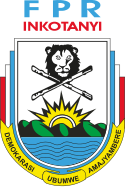
Back الجبهة الوطنية الرواندية Arabic Ruanda Vətənpərvər Cəbhəsi Azerbaijani Руандыйскі патрыятычны фронт Byelorussian Руандыйскі патрыятычны фронт BE-X-OLD Front Patriòtic Ruandès Catalan Rwandská vlastenecká fronta Czech Rwandas Patriotiske Front Danish Ruandische Patriotische Front German Ruanda Patriota Fronto Esperanto Frente Patriótico Ruandés Spanish
Rwandan Patriotic Front Front Patriotique Rwandais | |
|---|---|
 | |
| President | Paul Kagame |
| Secretary-General | Wellars Gasamagera |
| Founder | Fred Gisa Rwigyema |
| Founded | December 1987 |
| Headquarters | Kigali |
| Ideology |
|
| Political position | Big tent |
| Colours | Sky blue |
| Chamber of Deputies | 36 / 80 |
| Party flag | |
 | |
| Website | |
| rpfinkotanyi | |
The Rwandan Patriotic Front (RPF–Inkotanyi; French: Front patriotique rwandais, FPR)[1] is the ruling political party in Rwanda.
The RPF was founded in December 1987 by Rwandan Tutsi in exile in Uganda because of the ethnic violence that had occurred during the Rwandan Hutu Revolution in 1959-1962.[2][3] In 1990, the RPF started the Rwandan Civil War in an attempt to overthrow the government, which was dominated by Hutu. Later on, the 1994 Genocide against the Tutsi occurred that ended on 4 July with the RPF conquest of the entire country.[4][5][6] The RPF have ruled the country since then as a one-party state, and its current leader, Paul Kagame became the president of Rwanda since 2000.[7]
Since 1994, RPF rule has been characterized by political repression,[8][9] relative stability, and economic growth.[10][11] Among other policies implemented by the government are the non-recognition of ethnic identities and a wide-ranging prohibition on what the government calls "genocide ideology", including discussion of ethnic differences.[12][13]
- ^ "Rwanda: It's a Landslide for RPF-Inkotanyi". All Africa. 4 September 2018. Retrieved 22 January 2019.
- ^ "Rwanda - A Chronology (1867-1994) | Sciences Po Mass Violence and Resistance - Research Network". www.sciencespo.fr. 2016-01-25. Retrieved 2023-11-15.
- ^ Reporter, Times (2011-07-01). "Rwanda's struggle for liberation". The New Times. Retrieved 2023-11-15.
- ^ "RPF-Inkotanyi Was Driven By Ideological Clarity And Visionary Leadership - Gen. Kabarebe". KT PRESS. 2023-04-11. Retrieved 2023-11-15.
- ^ DIVINE, ISHIMWE (2023-04-02). "Seven reasons why RPF-Inkotanyi remains on the right path". INGENZI NEWS. Retrieved 2023-11-15.
- ^ Reporter, Times (2014-07-07). "RPF ideology supersedes individuals". The New Times. Retrieved 2023-11-15.
- ^ Thomson, Susan (2018). Rwanda: From Genocide to Precarious Peace. Yale University Press. p. 185. ISBN 978-0-300-23591-3.
- ^ Stroh, Alexander (2010). "Electoral rules of the authoritarian game: undemocratic effects of proportional representation in Rwanda". Journal of Eastern African Studies. 4 (1): 1–19. doi:10.1080/17531050903550066. S2CID 154910536.
- ^ Matfess, Hilary (2015). "Rwanda and Ethiopia: Developmental Authoritarianism and the New Politics of African Strong Men". African Studies Review. 58 (2): 181–204. doi:10.1017/asr.2015.43. S2CID 143013060.
- ^ Nyenyezi Bisoka, Aymar; Geens, Hilde (2021), Omeje, Kenneth (ed.), "The Price of Progress: Economic Growth, Authoritarianism, and Human Rights in Rwanda", The Governance, Security and Development Nexus: Africa Rising, Cham: Springer International Publishing, pp. 253–271, doi:10.1007/978-3-030-49348-6_13, ISBN 978-3-030-49348-6, retrieved 2024-03-13
- ^ "How the West's Favorite Autocrat Engineered Africa's Most Dramatic Turnaround". Bloomberg.com. 2024-01-25. Retrieved 2024-03-13.
- ^ "Safer to stay silent: The chilling effect of Rwanda's laws on 'genocide ideology' and 'sectarianism' - Rwanda | ReliefWeb". reliefweb.int. 2010-08-31. Retrieved 2024-03-13.
- ^ "Don't Ask, Don't Tell: Approaches to Ethnicity in the Ethiopian and Rwandan Peacebuilding Processes". Journal of Public and International Affairs. Retrieved 2024-03-13.
© MMXXIII Rich X Search. We shall prevail. All rights reserved. Rich X Search